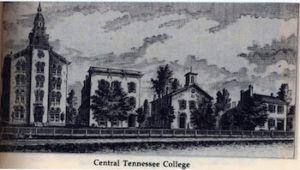
*On this date in 1865, we celebrate Central Tennessee College.
This was a historically black college (HBCU) in Nashville, Tennessee, founded by missionaries on behalf of the Methodist Church to serve freedmen. In 1876, the Medical Department of Central Tennessee College was established as the first medical school for Blacks in the South. In 1900, it became Walden University and continued to provide education and professional training to Blacks.
It was financially supported by Samuel Meharry and his four brothers, Scots-Irish immigrants who became philanthropists. 1915, the medical department received a separate charter and became Meharry Medical College. It continues in Nashville. In 1915, it was chartered separately and became an individual institution. It is one of the constellations of colleges in Nashville. After regrouping as a junior college in 1922 and offering a two-year associate degree, Walden College closed in 1925 due to financial difficulties and competition with state-run colleges. After 1935, its second campus (acquired in 1922) served Trevecca Nazarene University.
The university then had thirteen departments and 68 faculty. After the state established Tennessee Agricultural, Industrial, and Normal State School, now Tennessee State University, in Nashville in 1912, Walden University had more trouble attracting students and reframing its mission. In response to lynchings and disfranchisement, many ambitious Blacks left Nashville and other southern areas in the Great Migration to northern cities for work and more freedom.
The percentage of the black population in the city dropped sharply from 40 percent in 1890. Due to other demographic influences and economic changes, by the 1970s, only 22 percent of the city was black. In 1922, Walden University was renamed Walden College and was moved to a 12-acre (49,000 m2) campus overlooking the black neighborhood of Trimble Bottom. It served as a junior college, offering pre-medical and pre-law programs. Continuing financial difficulties forced its closing in 1925. In 1935, the campus was leased by Trevecca Nazarene University, a private Christian institution affiliated with the Church of the Nazarene, which purchased in 1937.